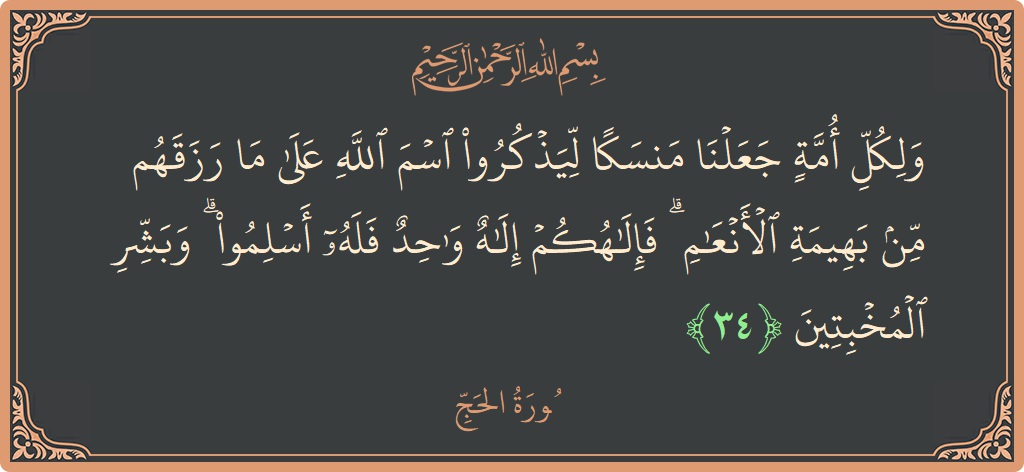Surah Al-Hajj: Verse 34 - ولكل أمة جعلنا منسكا ليذكروا... - English
Tafsir of Verse 34, Surah Al-Hajj
English Translation
And for all religion We have appointed a rite [of sacrifice] that they may mention the name of Allah over what He has provided for them of [sacrificial] animals. For your god is one God, so to Him submit. And, [O Muhammad], give good tidings to the humble [before their Lord]English Transliteration
Walikulli ommatin jaAAalna mansakan liyathkuroo isma Allahi AAala ma razaqahum min baheemati alanAAami failahukum ilahun wahidun falahu aslimoo wabashshiri almukhbiteenaTafsir of Verse 34
Commentary
وَلِكُلِّ أُمَّةٍ جَعَلْنَا مَنسَكًا (And for every Ummah We prescribed the act of sacrifice 22:34) The words مَنسَكً and نسَكً means several things in Arabic such as sacrifice of animals, the rites of pilgrimage, and also worship of Allah Ta’ ala. This word has been used in the Qur'an at several places and conveys one of the three meanings. In the present context, the word can carry all the three meanings. Mujahid and some other commentators think that here the word مَنسَكً refers to the sacrifice of the animals in which case the verse would mean that the obligation to offer sacrifice, which has been placed on this Ummah is nothing new, because all the other peoples were likewise bound to do so. On the other hand, according to Qatadah the word means the rites of the pilgrimage, and thus the verse would mean that these rites which have been prescribed for the present Ummah were made obligatory on the people of earlier ages also. Ibn ` Arafah has interpreted the word مَنسَكً to mean worship of Allah, and so the meaning of the verse would be that the worship of Allah was made obligatory on all the peoples of bygone ages and though there were differences in the forms of worship, yet in essence it remained unchanged.
وَبَشِّرِ الْمُخْبِتِينَ (And give good news to those who turn to Him in humbleness). The word خَبت means ‘a depressed tract of land’ and means ` a person who deems himself humble and lowly'. According to ` Amr bin Aws مُخْبِتِينَ are those people who do not wrong others and if somebody wrongs them, they do not seek revenge. Sufyan has observed that they are the people who are contented with Allah's will and remain agreeable in all circumstances, comfort or trouble and poverty or affluence.
Rites of Sacrifice have been prescribed for every Nation in the World
Allah tells us that sacrifice and shedding blood in the Name of Allah has been prescribed for all nations. `Ali bin Abi Talhah reported that Ibn `Abbas said,
(And for every nation We have appointed religious ceremonies,) "Festivals." `Ikrimah said, "Sacrifices."
(And for every nation We have appointed religious ceremonies,) Zayd bin Aslam said, "This means Makkah; Allah did not appoint religious ceremonies anywhere else for any nation."
(that they may mention the Name of Allah over the beast of cattle that He has given them for food.) It was recorded in the Two Sahihs that Anas said, "The Messenger of Allah brought two fat, horned rams; he said Bismillah and Allahu Akbar, then he put his foot on their necks.
(And your God is One God, so you must submit to Him Alone.) Your God is One, even though the Laws of the Prophets may vary and may abrogate one another. All of the Prophets called mankind to worship Allah Alone with no partner or associate.
(And We did not send any Messenger before you but We revealed to him (saying): None has the right to be worshipped but I, so worship Me.) 21:25. Allah says:
(so you must submit to Him Alone.) meaning, submit to His commands and obey Him in all sincerity.
(And give glad tidings to the Mukhbitin.) Mujahid said about Mukhbitin, "Those who find contentment in their faith." Ath-Thawri said, "Those who find contentment in their faith and who accept the decree of Allah and submit to Him." It is better to interpret it by what comes next, which is:
(Whose hearts are filled with fear when Allah is mentioned,) meaning, their hearts fear Him.
(and the patient who bear whatever may befall them) meaning, of afflictions.
(and who perform the Salah,) they fulfill the duties which Allah has enjoined upon them, the duty of performing the obligatory prayers.
(and who spend out of what We have provided for them.) the good provision which Allah has given them. They spend on their families and servants, and on the poor and needy; they treat people kindly while remaining within the limits set by Allah. This is in contrast to the hypocrites, who are the opposite of all this, as we have discussed in the Tafsir of Surah Bara'ah; to Allah be praise and blessings.
